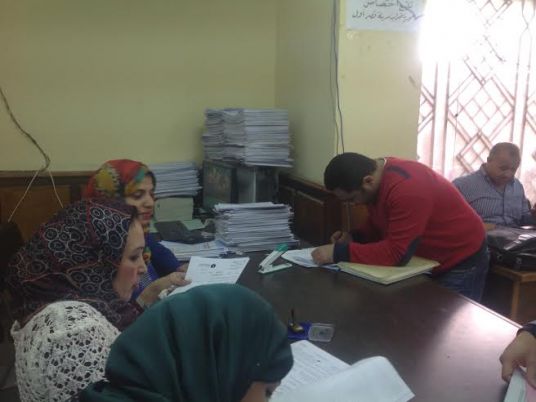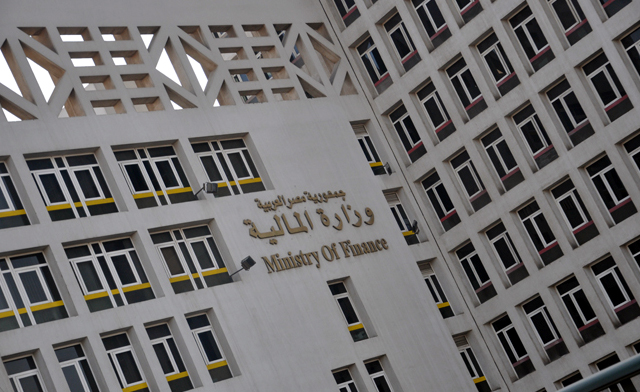An abrupt implementation of a 10 percent capital gains tax on shareholders and investment funds that profited from the takeover of National Societe Generale Bank by Qatar National Bank created enough of an uproar to force authorities to reconsider and, just as abruptly, backtrack.
As a first reaction, shares of NSGB, the second biggest private bank, fell 10 percent in late March, pushing the benchmark index down to its lowest level since December. A day later, officials said investors can buy back their shares stocks and avoid being taxed on the sale.
This week, the market witnessed yet another about-face.
Mirroring the “here today, gone tomorrow” nature of most decisions taken by the government since late last year, it was reported Monday that taxes collected from shareholders just two weeks ago from QNB’s acquisition of NSGB would be refunded.
Abdallah Shahata, an aide to the finance minister, told Reuters that the move comes after Egypt decided to cancel a planned tax on stock market dividends and share gains in takeover bids.
It wouldn’t be the first time an announced tax was retracted by the same authorities who touted its importance just days before. The capital gains tax itself is part of a bundle of taxes presented in the government’s latest economic program, in a bid to spur recovery.
It is also supposed to set the scene, along with a number of other contentious measures relating to subsidies, for a much-delayed US$4.8 billion loan from the International Monetary Fund.
The initial decision to levy a capital gains tax on shareholders, when in fact it was never announced when such a tax would come into effect, caused justifiable alarm among investors who are already fighting off heightened wariness when it comes to Egypt’s turbulent political landscape and uncertain economic future.
It did little to help assure investors that their transactions have a secure pathway, as opposed to one dotted with potential pitfalls.
Taxes are arguably not the most favorite part of doing business among investors. In Egypt’s case, evasion was rampant to the point of becoming commonplace, driven mainly by what was generally seen as unduly hefty corporate taxes.
When it was somewhat reformed under former Prime Minster Ahmed Nazif’s Cabinet, and corporate taxes were lowered, a nationwide campaign set out to fasten a friendly face on the tax system, along with its collectors and auditors.
The main selling point peddled by the Egyptian Tax Authority was to start off on a clean slate with an underlying assumption of “you trust us, and we’ll trust you.” But while the tax authority did manage to increase its tax revenues in the following years, the system was never dramatically overhauled.
Shortcomings persist, and many think more progressive taxation must be put in place, along with placing a heavier burden on the wealthy rather than the less fortunate.
Tax revenues account for about 70 percent of the state budget, according to the tax authority. The government collected about LE170 billion in taxes during the 2011/12 fiscal year.
For the current government, taxes have been an equally beleaguered issue. A flurry of proposed taxes introduced in late December was swiftly suspended after facing considerable and instantaneous public backlash.
The number of proposed tax hikes has since shrunk, and this latest capital tax fumble creates a foggier climate at a time when investors and economists are famished for clarity.
Market analysts said that subjecting the transaction to a sudden tax would only serve to drive away foreign investors and weaken confidence in the market, especially since it was announced after the takeover deal was sealed.
More bumpy rides
Talk of a tax on the NSGB buyout comes amid two key cases weighing on the overall stock market, which has gone from the best performing market in the region in 2012 to one of the worst since the start of this year.
A tax dispute with Orascom Construction Industries for the payment of an alleged LE14 billion in back taxes, which the company denies it owes, has also caused fluctuation in the market.
Also recently came the decision to freeze the assets of more than 20 of the top local and global investors, as well as the former president’s two sons, for alleged involvement in insider trading that led to illegal profiting from the sale of Al-Watany Bank of Egypt.
Until recently, many foreign investors remained strident in their trading of Egyptian stocks, ignoring broader political problems they believed would be resolved in due course.
But the recent developments have raised even more worries than already existed, that the government may be reluctant to let the stock market operate freely and may deem it necessary to intervene randomly and unpredictably — and then rescind its decisions when faced with pressure.
If this sentiment takes hold, the market could suffer irreparable damage in the long term, with companies hesitating to list their assets and investors opting out to friendlier markets.
“If you want to attract investors, you don’t go around trying to nick money off citizens, like with imposing a sudden 10 percent tax on the NSGB deal,” said financial analyst Osama Mourad during a television interview.
He had previously told Reuters that it’s akin to “robbing investors.”
Earlier, the tax authority had said NSGB’s French parent, Societe Generale, would be exempt from taxes for the transaction, an agreement created to avoid double taxation between Egypt and France. This left minority stakeholders in NSGB with the potential 10 percent levy on the deal.
Despite news that minority shareholders will be refunded, the past weeks have reaffirmed the perception of Egypt’s regulatory environment as being haphazard.
“We are going through changing times, and the current situation is a result of lacking mechanisms on part of the government to address recurring problems of pressures on the investment climate in the stock market, and sovereign disputes, such as the taxes problem,” says Mohsen Adel, economic expert and deputy president of the Egyptian Association for Finance and Investment Studies.
He says the perceived hostility toward businessmen and investors is actually a product of confusion and disarray.
“I don’t believe the current government is targeting investors because, at the same time, they are actually seriously trying to reconcile with other businessmen. … [The government] is not targeting investors as much as it is confused and baffled,” he adds.
He echoes the sentiment of many who say the incumbent ministers lack the experience to properly handle the stagnant economy without battering it further.
“The [tax authority] sent the letter to the Egyptian Exchange notifying it of the capital market tax, as a precautionary measure. The authority is not applying the tax, … [it] is only trying to avoid a situation like the current one with OCI.
“The OCI problem resulted in sensitivities when addressing major stock market transactions,” Adel says.
Selective policies
Instead of properly restructuring the complicated tax system, the government has chosen to go after back taxes from big companies, a strategy that has come under fire for being selective in targeting some businesses and not others.
“Egypt is trying to implement economic reform, but without a clear program or road map due to the lack of political stability,” Adel says.
The Shura Council is presenting an array of critical changes to the tax law, but authorities have not weighed the expected tax revenues against its impact on the market and the overall business community.
The stamp tax, Adel cites as an example, was expected to generate about LE200 million to 250 million annually, but just putting the idea of imposing a stamp tax out there resulted in losses of about LE21 billion on the stock exchange in the first quarter of 2013 alone.
The negative impact of imposing such tax, therefore, was miles greater than the expected revenues.
“Major issues such as imposing new taxes must be put up for extended dialogue with the business community to avoid damaging the investment climate,” Adel urges.
Capital outflows outnumber foreign direct investment, and with foreign reserves falling to disturbing lows, tourism not yet on the path to recovery and Suez Canal revenues down 7.4 percent, there is little in the way of hard currency liquidity.
This comes as the IMF loan still awaits approval, and along with it, billions of dollars in locked funding.
A new player
The tax authority approved QNB’s offer for NSGB in February, after insisting that the Qatari bank buy 100 percent of NSGB at market value. In the end, QNB acquired 97 percent of NSGB’s total shares, priced at LE38.65 each, according to the exchange.
At the time, the price was considered a small premium above the market price, but on Monday and after the debacle, it had dropped to LE27.
Egypt’s stock exchange said it will take NSGB off of the main EGX 30 blue chip index after the sale to QNB is complete.
Ali Shareef al-Emadi, QNB Group chief executive officer, said in a news statement that the acquisition of NSGB is in line with the group’s strategy to expand in selected markets across the region.
QNB Group said it recorded a net profit of 8.3 billion Qatari riyals in the year to December, 11 percent more than the previous year.
“Egypt has always been one of the top countries in the group’s expansion plans, due to the strategic importance of the Egyptian market,” Emadi said.
He added that the group would work closely with NSGB staff to increase its activities in the Egyptian market, adding that the network of branches and ATMs across the country may double over the coming five years.
QNB will also share its technological capacities with NSGB to offer e-banking services to clients.




